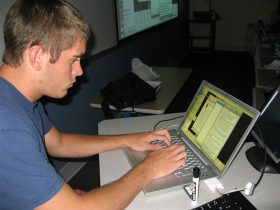Students in a summer sociology course had an opportunity this week to learn about recovery efforts in Iraq by interacting directly with an artist living in Baghdad who answered questions from them in an online chat.
Led by professor Tom Arcaro, two dozen students in SOC 131 (Sociology Through Film) took turns at a podium in their third floor Alamance classroom to send questions via Internet chat with Ahmed Fadaam, an Iraqi sculptor and journalist now living in Baghdad who last year served as a Scholar-in-Residence at Elon.

The interview was originally planned to take place via video conferencing through the Internet service Skype, but connectivity issues in Baghdad prevented that from happening.
“Ahmed’s responses were very interesting to everyone and more than one student commented that they’d be emailing mom tonight telling her about chatting with a man in Baghdad,” Arcaro said. “The class said goodbye to Ahmed with a round of applause and a thank you.”
Students watched the documentary “No End in Sight” as background for its chat with Fadaam.
Below is an edited transcript of the talk:
STUDENT: I know you did several sculptures for Saddam when he was living. Did you ever meet him personally?
AHMED FADAAM: I did once.
STUDENT: Also, how did you feel the day he was executed, and how did that affect you?

AHMED FADAAM: I, as (did) many Iraqis, felt that Saddam was a dictator and we were waiting for the day to see him brought to trial. Back then we lived in peace… if you didn’t mess with the government the government (wouldn’t) mess with you.
STUDENT: Do you live in fear on a daily basis and do you hear gunfire near your house?
AHMED FADAAM: Yes.
STUDENT: How does the University of Baghdad compare to Elon University? Also how many hours a day do you have power in your house?
AHMED FADAAM: The power is better than it used to be in 2003. But it is not 24 hours a day. We are getting it for 6-8 hours most. The situation is much better now that it used to be a year ago. We don’t hear gunfire on a daily basis and the explosions are less than before. But that doesn’t mean that they are over. It is still happening every now and then.
STUDENT: How much contact do you have with U.S. troops on a daily basis?
AHMED FADAAM: Since I came back to Baghdad I haven’t seen any American soldiers in the streets. They are inside their bases now. The only ones we are seeing are the Iraqi military.
STUDENT: What is your opinion on Obama?
AHMED FADAAM: I think that president Obama is a great man and he is working to have some changes done to improve the image of the United States in the world.
STUDENT: What is your overall opinion on the U.S.’s involvement in Iraq and how much longer do you think we should have troops there if they should be there at all?
AHMED FADAAM: If I can rewind time then I wouldn’t approve the involvement of the U.S. in Iraq. You all saw what happened to Iraq and the Iraqis and for what? And as long as they are in Iraq then the violence will not be over. It is true that they are inside their bases now but there are who take their existence in Iraq as a reason for violence.
STUDENT: You say that you do not see American troops in the streets anymore, however we are still deploying many troops, do you think they have become more prevalent in other places? Where are they going? Also, do you feel we still need to have as many troops over there as we do?
AHMED FADAAM: There are also who still think that Iraq is occupied by the US and this is also a reason for violence … I think that the US should leave Iraq for the Iraqis and deploying more troops will not do anything.
STUDENT: I know you said that if you could rewind time you would not want U.S. involvement in Iraq. However, since we cannot rewind time how do you compare the new government that is in place to Saddam’s government?
AHMED FADAAM: Back then we had one Saddam. Now we have so many of him. All of those who came to power are trying to do the same as he did before. When I said that I don’t approve of the American presence in Iraq, I meant that getting rid of Saddam could’ve been done by the Iraqis themselves.
STUDENT: Being that you have 2 children, how do you think this has affected them? Does it bother/startle your family hearing gunshots and bombs going off or has it just became a way of life?
AHMED FADAAM: Until 2006, when I took my family out to Syria, my kids got used to hearing the sounds of gunshots and explosions. It is a daily thing for them and became part of their life. They even got used to see dead bodies in the streets. They stopped asking us questions about them.
STUDENT: As history has taught us in the past, countries rise and fall in power. Rome is a great example of an empire that is now non-existent. Given the current economy and poor handling of foreign affairs, does the rest of the world see the U.S. as a fading power and are we just too blind to see it, or do you think we will be able to turn it around?
AHMED FADAAM: For the U.S., I say it is in your hands. As you said, every civilization can fall, but it is up to its people. Don’t let the world hope that the US would fall … think of the reasons that is making them hope so.
STUDENT: Back to the question on the new government compared to Saddam’s government, I was wondering if as an Iraqi do you prefer democracy? It doesn’t seem like it is perfect democracy yet. However, do you think the government is headed in the right direction to democracy and away from all of the violence?
AHMED FADAAM: Democracy cannot be brought to a country in one night. This is what happened. People who were living under dictatorship for 35 years suddenly found them selves free. How long did it take the Americans to have democracy? Also… Democracy cannot be brought with guns. Think about it. Bombs do not build, they only destroy things.
STUDENT: When do you plan on bringing your family back to Baghdad? Do you think it is safe for them to return?
AHMED FADAAM: My family is already in Baghdad. I brought them back when I found the situation is safer than before, but still I’m ready to send them back to Syria if I feel that the situation is not safe.
STUDENT: Would you go back with them? And are your kids in school?
AHMED FADAAM: My kids were in school back in Syria. I’m waiting for the holiday to end so I can send them to school here in Baghdad. Hopefully I will find some good ones.
STUDENT: Is food and water easily available? Are the markets open and functioning?
AHMED FADAAM: Water is bad. We have to use pumps to suck it from the pipes. That is why it is not healthy. There are shops open all over the place. You can get what you want but you have to be careful. With no power all the time and in this hot weather, you have to know what you are buying.
STUDENT: Do you feel like a new wave of nationalism has come to Iraq and your people or do you think that, with the struggle for someone to come to power, that the people have become more divided?
AHMED FADAAM: The Iraqis became divided with the first day of the invasion. The parties that were brought unfortunately, by the Americans, started telling the people that they are not one and they are majorities and minorities.


